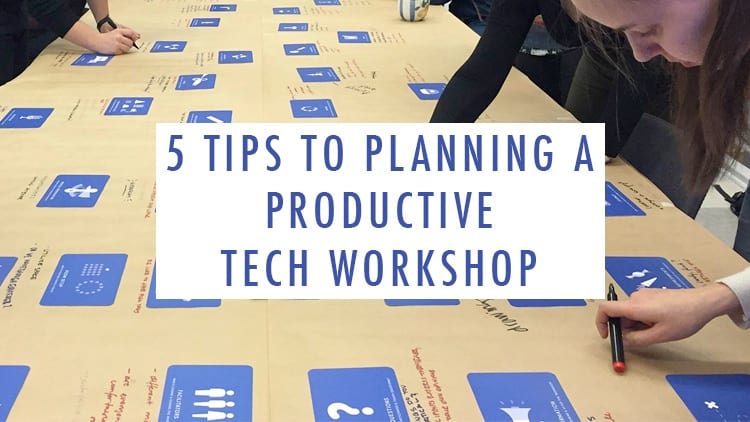So you’re planning a tech workshop. Where do we begin? Unlike lectures where interactions are largely one-way, tech workshops strive to impart practical skills rather than to inspire and motivate action. Workshops also tend to work with a smaller group of participants due to its discussion and activity-heavy nature, where more attention has to be given to each attendee. Think of tech workshops as a crash course — they mostly range from half a day to two or three days, and you have the limited amount of time to equip your attendees with the basic understanding and technical skills you are presenting.
With time of the essence, great planning is vital to a successful seminar! Read on for 5 tips on planning a productive tech workshop:
Know your priorities!

With a tight time frame to educate your attendees, it’s best not to waste any time on the extras. Take your workshop topic as a guideline and plan your agenda accordingly, prioritizing time on the basics and essential knowledge that your attendees should take away from the seminar. You’ll never know if you might end up having to spend more time on a particular subject so allow some buffer time in your schedule. It is also good to have additional subjects in reserve, in the event where your attendees are able to catch on quickly.
Get hands-on

Most things are best learned with practice, so get your participants to put that knowledge into action! Have your attendees follow along as the instructor demonstrates and explains, so that they are able to catch on with repetitive practice. As mentioned earlier, this is where workshops differ from lectures — your attendees aren’t going to pick up these skills by simply listening to you talk about it. Prepare activities that allow them to put the skills into action and explain to them the concept of how they can apply said skills.
Ensure you have enough facilities

If your workshop is instructing on a subject that requires the use of certain materials or equipment, be sure that you have enough of them on hand for each of your participants. Always confirm your number of attendees before the event date so that you can have an approximation of the quantity you need. Also, remember to prepare extra resources in the event where your equipment are faulty, or there are extra attendees. Having a lack of facilities will not reflect well on the workshop, and may even trigger a negative experience for your attendee if they are not given equal opportunity to practice their skills, so make certain that there’s enough to go around!
Have teaching assistants on hand

Because workshops are so heavy on practical usage and hands-on activities, a lot of attention has to be given to each attendee in order to guide them through the process and resolve any issues they are facing in practice. This cannot be done by the instructor alone, so have your facilitators and teaching assistants on hand who will be able to address any questions and concerns promptly without disrupting the workshop. Make sure your staffs are qualified to assist and instruct your attendees though; you wouldn’t want to cause your participants more confusion!
Schedule time for breaks!

A knowledge-intensive workshop can take its toil on your attendees and cause them to lose focus on the topic, so remember to schedule a break every two-three hours. This allows them to refresh their minds and absorb information better. Breaks are a great time for participants to loosen up their muscles, and have some refreshments. It also offers an opportunity for your attendees to socialize and make themselves comfortable with one another, which can improve their willingness to contribute and participate in the workshop, especially during discussions and group activities.
The primary objective of a tech workshop is to impart technical skills and knowledge, so keep in mind your primary subject and key takeaways for your attendees when planning the workshop. At the end of the day, your participants need to be aware of the fundamentals of your subject and be able to execute it independently, so ensure that they have grasped the concept and are given ample opportunity to practice and correct themselves during your workshop. That said, it is your responsibility as an organizer to provide sufficient manpower and resources to facilitate their learning. Finally, be sure to arrange a productive lesson plan and schedule so that your attendees can be at their optimum learning potential! What other tips do you have for planning a tech workshop? Share it with us by leaving a comment below!








